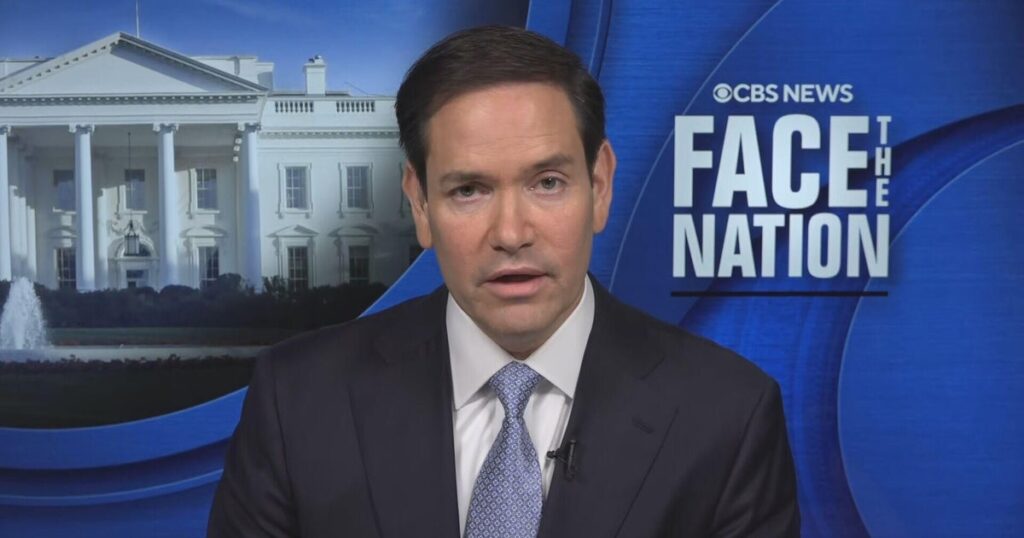Washington — The U.S. is ready to meet with Iran following the U.S. bombing of three Iranian nuclear sites, Secretary of State Marco Rubio said Sunday, while warning Iran that closing the crucial Strait of Hormuz would be a “suicidal” move for the regime.
Rubio, appearing on “Face the Nation with Margaret Brennan,” urged Iran to pursue diplomacy after the U.S. carried out what the Pentagon called the largest B-2 operation in U.S. history in an effort to cripple Iran’s ability to develop a nuclear weapon. Rubio said the U.S. has no current plans for further attacks on Iran unless “they mess around.”
Rubio said the U.S. mission “was not an attack on Iran, it was not an attack on the Iranian people. This wasn’t a regime change move. This was designed to degrade and/or destroy three nuclear sites related to their nuclear weaponization ambitions, and that was delivered on yesterday.”
“What happens next will now depend on what Iran chooses to do next,” Rubio said. “If they choose the path of diplomacy, we’re ready. We can do a deal that’s good for them, the Iranian people, and good for the world. If they choose another route, then there will be consequences for that.”
President Trump continues to prefer the path of diplomacy, Rubio said, noting that the U.S. pushed Iran to make a deal to give up its nuclear weapons ambitions before the strikes.
“We’re prepared, right now, if they call right now and say, ‘We want to meet, let’s talk about this,’ we’re prepared to do that,” Rubio said.
The question of how Iran will respond has raised fears that the regime could seek to block ships from traveling through the Strait of Hormuz, a critical choke point between the Persian Gulf and the Gulf of Oman that is used to transport about 20% of oil used around the world.
Rubio declined to say whether the U.S. would take military action if Iran closes the strait, or whether the U.S. would consider attacks on oil facilities by Iran’s proxy militias as direct acts by the regime: “I’m not going to take options away from the president, that’s not something we’re talking about right now in terms of being immediate.”
Rubio said closing the strait would affect the U.S., but it would have “a lot more impact on the rest of the world,” particularly on China.
“That would be a suicidal move on [Iran’s] part, because I think the whole world would come against them if they did that,” Rubio said.
Retired Gen. Frank McKenzie, the former head of U.S. Central Command and a CBS News contributor, said the U.S. would be able to clear the strait if Iran lined it with underwater mines.
“The Iranians do have the capability to mine the Strait of Hormuz. We have very good plans to clear that if we had to do it. We work on those plans all the time,” McKenzie told Brennan later in the show. “It would be a blow to world commerce, for a period of time, but at the end, the strait would be cleared, and I’m pretty confident the Iranian navy would all be sunk at the end of that operation.”
The U.S. operation on Saturday, which the Trump administration named “Operation Midnight Hammer,” bombed three nuclear sites in Iran, causing what the chairman of the Joint Chiefs of Staff said was “extremely severe damage and destruction.” The Pentagon acknowledged that capturing a complete assessment of the operation’s effectiveness will take time.
Brennan pressed Rubio on what specific intelligence pushed the president to make the decision to strike Iran. In March, Director of National Intelligence Tulsi Gabbard testified before Congress that Iran wasn’t building a nuclear weapon, testimony Mr. Trump declared “wrong.” Rubio said Iran, ahead of the strikes, had “everything they need to build nuclear weapons,” and pointed to assessments by the International Atomic Energy Agency, or IAEA.
“Here’s what the whole world knows. Forget about intelligence,” Rubio told Brennan. “What the IAEA knows, they are enriching uranium well beyond anything you need for a civil nuclear program. So why would you enrich uranium at 60% if you don’t intend to use it to one day take it to 90 and build a weapon? Why are you developing ICBMs?”
Brennan asked Rubio whether the U.S. will defend other nations in the Middle East if Iran launches attacks on their soil in response. Rubio said that’s why U.S. bases — and about 40,000 U.S. troops — are positioned across the Middle East.
“Well, that’s exactly why they’re there,” he said, adding, “All those bases are there because they’re afraid that Iran will attack them.”
Rubio insisted that the U.S. will defend Americans, including U.S. soldiers on military bases, from Iran and its proxies.
“They’ll attack us, is what they’re threatening to do,” he said. “So we’ll defend our people, obviously. We’ll defend our people. Well, they’ll attack our bases. And those are our bases, and we’re going to defend our personnel, and we’re prepared to do that.”
Rubio said he didn’t want to forecast what the U.S. might do if Iran retaliates.
“There are no planned military operations right now against Iran unless they mess around and they attack Americans or American interests, then they’re going to have a problem,” he said. “Then they’re going to have a problem, and I’m not going to broadcast what those problems are.”
https://www.cbsnews.com/news/marco-rubio-iran-strikes-nuclear-hormuz-face-the-nation/


